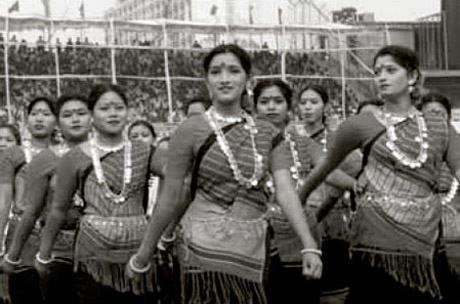5.2 ‘The prioritisation of a particular group – the nation – as a key constituting and identifying framework for human beings and their practices’
No particular form of articulating the nation is required by the formulation of this first element; the nation might be ‘imagined’ or ‘constructed’ as homogenous or as pluralistic and diverse, for example. However nationhood is imagined, though, it will invariably involve some form of suppression of alternative ways of classifying peoples. Consider that for most of us there are linguistic, class, ethnic, location, gender, religious and other aspects to our identities. If nationalists want to subsume all these under nationality as the primary marker of identity, we might have grounds to suspect the move. Often, observers distinguish liberal nationalism from illiberal nationalism. The former embraces the plurality of the sources of identity, while the latter subsumes other aspects under nationality Consider briefly three alternative ways of constructing or classifying political ‘community’, which may either cut across or reinforce nationalist classifications:
(a) ‘Functional’ communities. People often identify with functional rather than territorial groups. Class solidarities, for example, which arise from people's positions within the relations of production of a country (or a region, or indeed within the global economy), can and do cut across national and other territorially based solidarities. Marx, to cite the most prominent example, knew this well: ‘Workers of the world unite!’ was precisely a call for workers everywhere to unite against the exploitative conditions they shared, regardless of national or other attachments.
(b) Religious communities. Religion can operate like class in that it can establish and activate loyalties that owe little or nothing to territorial location or boundaries. Often a dimension of time and circumstance can transform religion, along with gender and class for example, from a subversive to a reinforcing element within nationalist discourses. In the Algerian war of independence from France in the late 1950s, for example, Islam was undoubtedly a reinforcing element within Algerian nationalism, albeit largely secondary to the secular and socialist character of the main liberation movement, the FLN. More recently, with the resurgence of a particular form of political Islam – another ideology, relatively recent on the global scene and powerfully important in the wake of ‘9–11’ – against the perceived corruptions of the governments of Algeria and a number of other Arab states, a particular interpretation of one religion has become a deeply subversive element.
(c) Regional and global community? It is a source of irony for some commentators that a resurgence of nationalism after the collapse of communism in Russia and in Eastern Europe has come at a time when the primacy of the nation-state in some key respects is being challenged by something called ‘globalisation’ (see Gieben and Lewis, 2005; Guibernau, 2005). According to some influential views, globalisation does involve large-scale trends which add up to a significant challenge to our dominant national conceptions of political community. David Held (2000) has recommended that we adapt democracy so that new ‘constituencies’ that cross national boundaries can be recognised and their members participate in decision making on cross-border issues. He and others have also advocated global government through a world parliament and other institutions. Such views see the community as made up of those affected by certain actions or phenomena, regardless of their territorial location and loyalties. It is people affected by, for example, AIDS, acid rain and global warming, who form a new sort of ‘constituency’ and a new type of collective interest. The concern here is about people in different countries, drawn together in new forms of ‘political community’ by having a stake in the outcome of pressing cross-border issues, and the need to downgrade more rigidly national-territorial (and to some degree also legal) definitions of political community.

